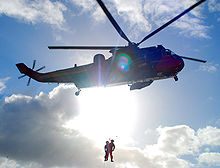Rescue
This article needs additional citations for verification. (July 2007) |





Rescue comprises responsive operations that usually involve the saving of life, or prevention of injury during an incident or dangerous situation.
Tools used might include search and rescue dogs, mounted search and rescue horses, helicopters, the "jaws of life", and other hydraulic cutting and spreading tools used to extricate individuals from wrecked vehicles. Rescue operations are sometimes supported by special vehicles such as fire department's or EMS heavy rescue vehicle.
Overview
Ropes and special devices can reach and remove individuals and animals from difficult locations including:
- Air-sea rescue
- Cave rescue
- Combat search and rescue
- Confined space rescue
- Helicopter rescue basket
- Hostage rescue
- Mine rescue
- Rope rescue
- Search and rescue
- Ski patrol
- Surface water rescue
- Swiftwater rescue
- Urban search and rescue
- Vehicle extrication
- Wilderness
Rescue operations require a high degree of training and are performed by rescue squads, either independent or part of larger organizations such as fire, police, military, first aid, or ambulance services. In the U.S., they are usually staffed by medically trained personnel as NFPA regulations require it.[citation needed]
Old meanings
In former centuries the word "rescue" had other meanings: for example, there is an old record of a countryman living where Wythenshawe is now, being prosecuted in a local court for "making rescue" of a pig which had been seized as a distress for non-payment of money owed.[1]
See also
- Animal rescue
- Civil defense
- Diver rescue
- Emergency management
- Extraction (military)
- International Rescue Corps
- Lifeboat (rescue)
- Rescue robot
- Technical rescue
- Vehicle extrication
References
- ^ "UK diver swims to safety after Australia shark scare - The Viral Info". Retrieved 23 Oct 2017.
